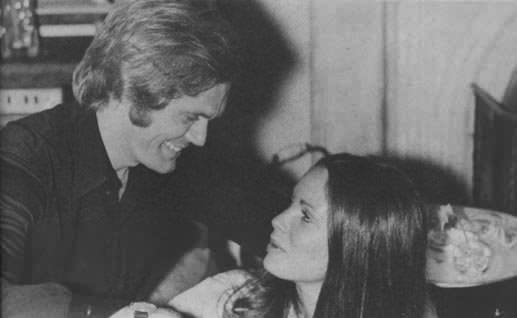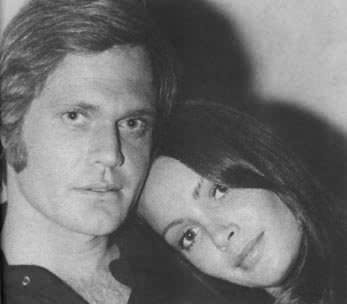- ROGER DAVIS TALKS ABOUT THE STRANGE
CONFLICT IN HIS MARRIAGE... AND THE STRANGER WAY HE WORKS IT
OUT!
- by Sally Farber
- TV Radio Show, January 1973
 Usually the conflict
in an actor-actress marriage comes when both are busily pursuing
a career and one or the other begins to feel neglected... or
jealous because the partner has become more successful. "In
my marriage it's different,'' Roger Davis smiles in that slow
way. "When Jackie and I fight it's over her wanting to stay
home to be a housewife and raise a family."
Usually the conflict
in an actor-actress marriage comes when both are busily pursuing
a career and one or the other begins to feel neglected... or
jealous because the partner has become more successful. "In
my marriage it's different,'' Roger Davis smiles in that slow
way. "When Jackie and I fight it's over her wanting to stay
home to be a housewife and raise a family."
This indeed is a strange conflict in a
Hollywood marriage, but then Roger is an unusual breed of man.
They don't fight, about it a lot, Roger hastens to add, but it
is a source of conflict between them.
"Jackie would like to start raising
a family and I would like to wait. She says we've waited three
years and that's long enough. She has a point, but I know that
I'm not ready for the responsibilities of a family, so I think
it would be wrong to go ahead with it just to please her. I don't
think you should become a parent until you feel you can be more
than just adequate at it. It's the most serious responsibility
a human being ever assumes, but too many people don't see it that
way at all. They have kids to satisfy their own egos, or as ‘love-offerings'
to one another, or sometimes even in the hopes of saving a marriage.
I think one of the reasons we have so many disturbed kids in this
world is because we have so many parents who had children for
the wrong reasons."
Roger, who is a friendly, relaxed, open
type is convincing on any subject he discusses. One reason might
be that pleasing, soft Kentucky dialect which sounds so 'down-home'
sincere.
"Oh, I question my own motives for
not wanting children now, just as much as I question the motives
of many who have them. Am I just being selfish, maybe just wanting
to keep Jackie all to myself? Is it just that I'm afraid of the
responsibility? Is it reluctance to upset the routine of our lives,
to give up a certain amount of freedom? I've questioned all of
these things, and I don't think any of them are true. I hope not.
I hope my reasons are what I think they are because when I do
have a family, I want to be the kind of father kids brag about
to their friends. I want my kids to like me as well as
love and respect me, and I don't think you can fool kids. I think
if you're going through the motions of being a parent, or if deep
down you resent them, they pick up on that and it reflects in
their behavior." Although there are conflicts like this,
Roger works them out like this--reasonably!
He sounds like a student of child psychology.
"A study of life," he corrects, smiling. "An observer.
I find people thoroughly fascinating. Their pleasures, their hang-ups,
what makes them laugh, what makes them cry, how we're all alike
and yet all different. Human nature is a never-ending source of
surprise and knowledge."
 Roger
met his beautiful wife a little over three years ago in his agent's
office. They went out to dinner and a month and a half later,
they were married. Among other acting assignments, she does Breck
commercials for television.
Roger
met his beautiful wife a little over three years ago in his agent's
office. They went out to dinner and a month and a half later,
they were married. Among other acting assignments, she does Breck
commercials for television.
Photo Caption:
Within a month and a half after they first met, Roger and Jackie
were wed. It was one of those cases of perfect chemistry!
"We live a pretty quiet life socially,"
he explains, "because that's the way we like it. We're not
party-goers. We prefer seeing friends in small groups where you
can really talk and exchange ideas. Cocktail parties are a joke.
People don't really communicate at gatherings like that."
When Roger and Jackie married, he was
among a surprisingly large number of talented young actors who
could always find work but who couldn't seem to find success.
In fact, Roger had come so close to the brass ring so often, a
man of less determination would have been ready to give up.
One example was a Screen Gems pilot that
at the time (four or five years ago) looked as though it couldn't
possibly miss. The series was based on From Here to
Eternity with Roger in the Montgomery Cliff role. Darren McGavin
in the Burt Lancaster part and Sally Kellerman in the Deborah
Kerr role. They went on location to Hawaii to film the pilot and
Roger still remembers his excitement at finally being involved
in a "sure thing."
What happened?
"Well," Roger smiled. "I
remember Sally Kellerman saying that the only way Screen Gems
could blow a sale on From Here to Eternity was to make
the worst pilot film ever made in the history of television. Need
I say more?"
There were other pilots that did not sell
and other times when he was almost, but not quite, chosen for
a series. Two of them, ironically, involved Peter Duel. The first
was at Screen Gems when they were casting both for the From
Here to Eternity pilot and for another, Love on a Rooftop.
Roger and Peter were both being considered for both parts. As
it turned out, Roger was cast in Eternity; Peter in Rooftop.
The second time was when Universal was
casting Alias Smith and Jones. Roger was originally to
do Ben Murphy's part. Then when they signed Peter, who was already
under contract to them, they decided there wasn't enough contrast
between the two men. They replaced Roger with Ben because they
felt he had a 'Paul Newman' type sex-appeal the women just love.
On still another occasion, Roger and Pete
were both cast in a movie called Young Country (now in
release in Europe). Peter was to have played the leading man and
Roger the villain. At the last minute, the director switched their
roles.
They had become friends with all the path-crossing
their lives had taken, so it was a doubly traumatic experience
for Roger to replace Peter in Alias Smith and Jones.
 In fact,
it's still difficult for him to talk about and he remembers the
first few weeks on the show as "utter hell."
In fact,
it's still difficult for him to talk about and he remembers the
first few weeks on the show as "utter hell."
Photo Caption:
They've been married three years now and are starting to talk
about having babies. But at this time in his life, Roger feels
he is unable to give enough of himself to be a good father--and
that's very important to him!
He broke down several times during shooting
the first day on the set and had to leave in order to regain his
composure.
"I was re-doing scenes Peter had
already done, so they had to be exact and we had to watch him
on the screen to get positions right. I think that was the worst
day of my life. Trying to do comedy while looking at your dead
friend up on the screen...he wasn't even buried yet...you
know, 'the show must go on' and all that rot.
"There were five shows left to do
to finish up last season and I felt Peter's ghost beside me through
every one of them. What a waste! What a loss! He had so
much talent, and in addition to that, he was one of the nicest
guys I've known in this business.
"Everyone on the set felt a tremendous
sense of loss, but they all went out of their way to help me.
Ben Murphy was a great help. In time of tragedy, you find out
what people are made of.
"At first I had such mixed emotions
about taking over Pete's role I couldn't sleep. The idea of profiting
from a friend's death kept preying on my mind until I was sick
with it. Of course, I wanted the role. It's a great part and any
young actor would appreciate the opportunity. But I felt guilty.
"When the best break you've had finally
comes, to have it come because one of your good friends committed
suicide is just horrible. I couldn't stop brooding about
it for a long time. But I'm better now. For one thing I know that
if Peter were alive and going to leave the show, which he wanted
to do, he would have been happy to have me replace him.
"But more important, I've finally
accepted that whatever problems and torments led him to kill himself
couldn't have come about because of Hollywood and 'the system'
in which he worked. They had to have started years before, in
his childhood, and instead of being relieved, they festered and
grew. The tragedy is that there was no help for Peter, or rather
that he didn't find any in time."
Now Roger is looking forward to the new
Smith and Jones season and if the show goes off the air
after this year, he knows there will be other shows, other opportunities.
"I learned pretty early in my career
to live with disappointment," he says quietly. "Like
anything else it's a part of life. The idea is not to take it
personally, not to let it get you down. I'm always optimistic
about the future." And just as he has worked out the strange
conflict in his marriage, so he works out the everyday problems
that come up.
Back to Articles
List
 Usually the conflict
in an actor-actress marriage comes when both are busily pursuing
a career and one or the other begins to feel neglected... or
jealous because the partner has become more successful. "In
my marriage it's different,'' Roger Davis smiles in that slow
way. "When Jackie and I fight it's over her wanting to stay
home to be a housewife and raise a family."
Usually the conflict
in an actor-actress marriage comes when both are busily pursuing
a career and one or the other begins to feel neglected... or
jealous because the partner has become more successful. "In
my marriage it's different,'' Roger Davis smiles in that slow
way. "When Jackie and I fight it's over her wanting to stay
home to be a housewife and raise a family."
 Roger
met his beautiful wife a little over three years ago in his agent's
office. They went out to dinner and a month and a half later,
they were married. Among other acting assignments, she does Breck
commercials for television.
Roger
met his beautiful wife a little over three years ago in his agent's
office. They went out to dinner and a month and a half later,
they were married. Among other acting assignments, she does Breck
commercials for television. In fact,
it's still difficult for him to talk about and he remembers the
first few weeks on the show as "utter hell."
In fact,
it's still difficult for him to talk about and he remembers the
first few weeks on the show as "utter hell."